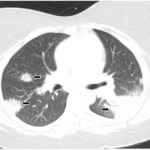Management
Because most of the data in neurosarcoidosis derive from retrospective, single-center trials, treatment is heavily reliant on expert opinion, and only two therapies for sarcoidosis have achieved official approval by the U.S. Food & Drug Administration.2 The European Respiratory Society (ERS) released a helpful guideline on the management of sarcoidosis in 2021, under the leadership of sarcoidosis expert Robert Baughman, MD, a pulmonologist and professor of medicine at the University of Cincinnati.4
Huzaefah Syed, MD, MPH, FACR, associate professor at Virginia Commonwealth University (VCU) and co-director of the multidisciplinary sarcoidosis program, pointed out that although corticosteroids are still the backbone of treatment for neurosarcoidosis, steroid-sparing agents, such as methotrexate, azathioprine and tumor necrosis factor inhibitors, have been playing a larger role in recent years.

Dr. Syed
Under the ERS guideline, glucocorticoids are the recommended first-line agents but may eventually be tapered if a patient has a good response. Patients with continued disease or flare could start a glucocorticoid-sparing agent, such as methotrexate. Mycophenolate mofetil (MMF) and azathioprine are additional glucocorticoid-sparing options (but with lesser evidence). Glucocorticoids can then be tapered if patients are doing well.
Dr. Syed noted that at the VCU Sarcoidosis Clinic, they move to methotrexate relatively quickly, or to azathioprine if methotrexate is contraindicated. Less commonly they might employ leflunomide or MMF.
The next options for persisting disease are adalimumab or infliximab per the ERS guideline and per the general practice at the VCU Sarcoidosis Center.
If patients have significant symptoms from small nerve neuropathy para-neurosarcoidosis, clinicians can also consider adding standard approaches for neuropathic pain, such as gabapentin, duloxetine or tricyclic antidepressants.
Refractory Disease
For patients who still have poorly controlled disease on infliximab or adalimumab, Dr. Syed recommends checking for antidrug antibodies, which can make these drugs ineffective. She explained that adding an oral immunosuppressant can decrease the risk of such antibodies; at VCU they prescribe methotrexate (or azathioprine or MMF if methotrexate is contraindicated) to most of their patients who are taking adalimumab or infliximab.
Neurosarcoidosis can mimic a great number of diseases. “So you always have to consider another diagnosis like infection or malignancy if your patient is not improving when you think they really should be,” said Dr. Syed.
Dr. Agnihotri concurred that particularly for refractory patients with possible neurosarcoidosis or isolated neurosarcoidosis without other systemic findings, it’s important to reexamine the diagnosis.


